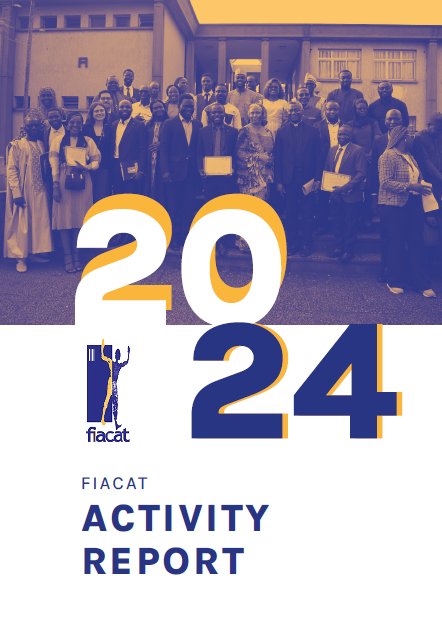Joint statement
African Commission on Human & Peoples’ Rights: 66th Ordinary Session
Item 8: Activity Reports of the Members of the Commission & Special Mechanisms
13 July to 07 August 2020
We are addressing you on behalf of the World Coalition Against the Death Penalty and its member organizations ECPM, FIACAT, FIDH, Foundation for Human Rights Initiative, the Kenya Section of the International Commission of Jurists, and Reprieve.
Our organizations would like to bring to the African Commission’s attention, the current situation of the death penalty on the African continent, considering the COVID-19 pandemic that is sweeping across the world.
Since January 2020, Africa along with the rest of the world has been living through a situation that is exceptional and has revealed the extent to which public health is a major imperative. While the situation has justified some emergency response measures, we wish to raise concerns in relation to the continued use of capital punishment within some member States.
We are disappointed to observe that executions have continued even in the times of this pandemic. One would have imagined that given the health crisis, member States that retain the death penalty would at least stop executing, if not handing down death sentences, but this has not been the case. Since February 2020, there have been 3 executions in Botswana, 12 in Egypt and 8 in Somalia. This is particularly concerning when viewed with the fact that COVID-19 has brought with it fundamental challenges in relation to fair legal representation. As an example, on 5 May 2020, following a trial in the Ikeja Court in Lagos, Nigeria, a man was sentenced to death for a murder committed in December 2018. The trial lasted only three hours and the sentence was handed down by videoconference via the Zoom app.
Despite this dire situation, the World Coalition and its co-signing organizations would like to congratulate the countries that have taken the steps to grant commutations, pardons and reduce the application of the death penalty. In these difficult times, which add death to more death, there are some examples for hope. On 15 April, the Cameroonian President promulgated a decree granting pardons and commutations that also extended to some those sentenced to death. Those who are eligible will see their sentences will be commuted to life imprisonment and those whose death sentences had already been commuted to life imprisonment will now see their sentences reduced to 25 years. Furthermore, those sentenced to death and having already benefited from a commutation of sentence will be granted a 5-year remission. Zimbabwe has also commuted the death sentences of people who had been sentenced over ten years ago. Kenya has released eight people who were on death row. In Chad, a new law on terrorism was unanimously adopted, removing the possibility of punishing those who are found guilty of “terrorist acts” with the death penalty. In Morocco, thanks to civil society action, 5,654 and 483 vulnerable prisoners have been pardoned, including a woman sentenced to death.
We call for concrete measures to guarantee the right to a fair trial and the right to legal representation during COVID-19, including by extending the time limits within which people sentenced to death can file an appeal and by imposing a moratorium on all sentences and executions. The current global health crisis has demonstrated how profoundly unfair the system has been on people already weakened by their heavy sentence. A lack of visits to people on death row and the inability for lawyers and judges to work normally are all unfair consequences of an ill-equipped system. Additionally, individuals facing the death penalty should be equally entitled to preventative health measures in places of detention in order to protect them from COVID-19. This is includes wherever possible, temporary release measures.
By comparison, those countries that have had the courage during this time to take a step, big or small, towards abolition show that our world is made better without this form of punishment, which should have been long consigned to the history books. During a time when many feel that we can either regress or, conversely, use the crisis to move more quickly towards the universal abolition of the death penalty, our organisations call on all Member States of the African Union, and in particular abolitionist states, to support the consideration and adoption by the African Union of the draft Protocol to the African Charter on the abolition of the death penalty, adopted by the ACHPR during its 56th Ordinary Session, in April 2015. This instrument would only commit those States that ratify it and could thus constitute a tool to support the political action of the many African States that are currently moving towards abolition. At a time when the composition of the African Commission has just been renewed, including that of its Working Group on the Death Penalty, Extra-Judicial, Summary or Arbitrary Killings and Enforced Disappearances in Africa, our organizations reaffirm their readiness to support the work of the Commission in general, and of the Working Group in particular, in achieving the continental abolition of the death penalty for the benefit of African populations.
This 10 October, civil society will mobilize to celebrate the 18th World Day Against the Death Penalty, which will focus on the right to legal representation, a right that is fractured by the health crisis since lawyers, who are essential to the protection of those facing the death penalty, have been economically weakened and are less able to assist their clients.
Thank you.




